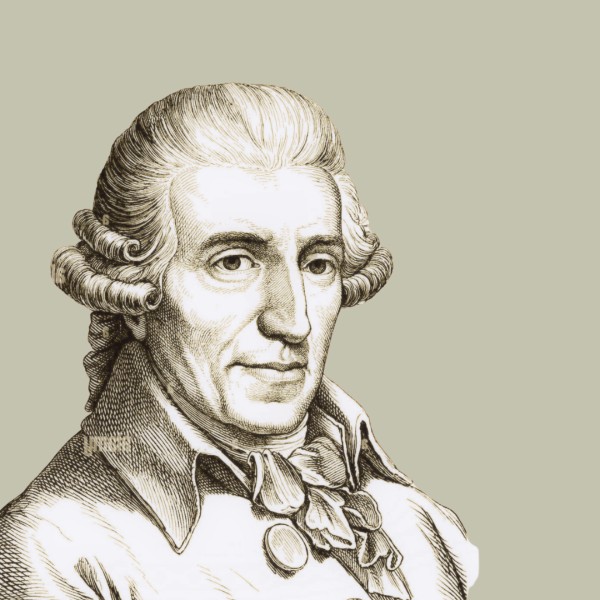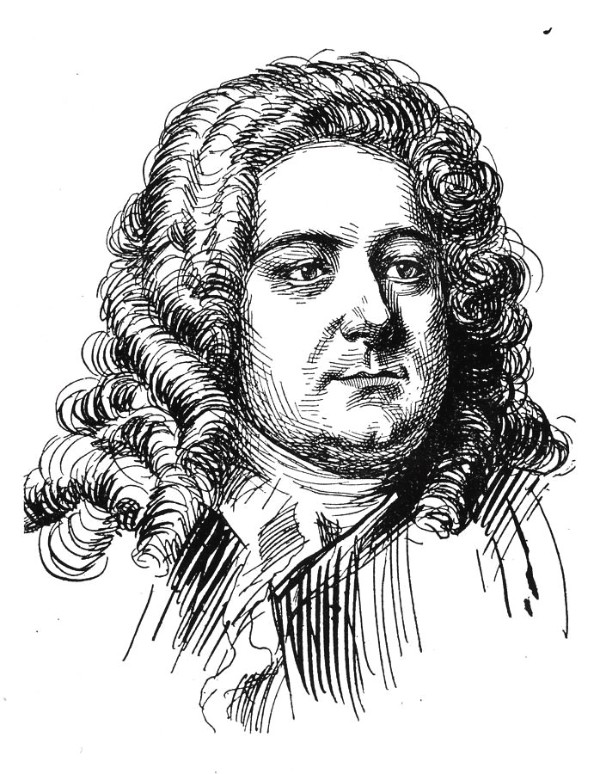For generations, mothers have been a source of inspiration for classical composers.

© friendsofchambermusic.ca
Today we’re looking at twenty pieces of classical music that pay tribute to motherhood, from song cycles written from a mother’s point of view to references to the Virgin Mary and Mother Goose, to the laments of mothers who have lost their children, to bittersweet musical tributes of children who have lost their mothers.
Frauen-Liebe und Leben by Robert Schumann (1840)
In 1840 Robert Schumann was preoccupied by domestic thoughts. In September he was able to marry his longtime love, Clara Wieck Schumann. Her father had done everything he could to discourage their union but was ultimately unsuccessful in preventing the marriage. (Read Composers in the Court Room
Robert Schumann versus Friedrich Wieck
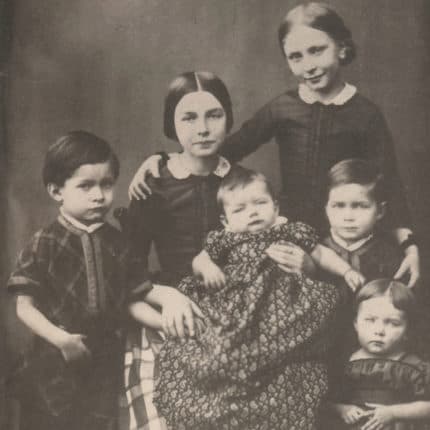
The Schumann children
It was against this backdrop that he wrote Frauen-Liebe und Leben (“A Woman’s Life and Love”). It’s a cycle of eight songs that follows a narrator’s journey of falling in love, getting married, and having a baby.
The seventh song includes the following lines:
Only a mother knows
What it means to love and be happy.
These lyrics are more than a touch ironic, given that Clara Schumann was one of the best pianists of her generation, and would become deeply unhappy when motherhood got in the way of her career.
Songs My Mother Taught Me by Antonín Dvořák (1880)
This song is the fourth in a set of seven called Gypsy Songs, which contains lyrics both in German and Czech.
The narrator sings of songs that have been passed down through generations, and the bittersweet joys that come from passing them to young children.
The song has arguably become more famous in its instrumental transcriptions, such as this one for violin.
Mother Goose March by John Philip Sousa (1883)
Mother Hubbard March by John Philip Sousa (1885)
John Philip Sousa wrote two nursery rhyme-themed marches. Both are charming, albeit not particularly famous.
Once when he was on tour, Sousa was unimpressed by an audience’s lukewarm response. He told his musicians, “If they’re going to act like children, we’ll give them children’s music!” and ordered them to take out the Mother Goose March.
That incident became an in-joke in the band.
“Mamma quel vino e generoso” from Cavalleria Rusticana by Pietro Mascagni (1890)
In this opera, a villager named Turiddu sleeps with his former fiancée Lola. Unfortunately, Lola is now married to a carter named Alfio.
When he finds out, Alfio challenges Turiddu to a duel. As he accepts the challenge, Turiddu bites Alfio’s ear until it bleeds, which signals that it will be a fight to the death.
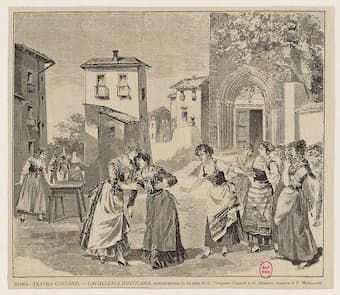
Cavalleria rusticana at the opera’s world premiere,
17 May 1890, Teatro Costanzi, Rome
Turiddu speaks with his mother and begs her that if he does not return, she treats his secondary love interest – a woman named Santuzza – kindly.
The final words to this aria are famous: “One kiss, mother! One more kiss! – Farewell!” Turiddu leaves to meet his fate, and his mother and Santuzza embrace. As you can imagine, Turiddu does not survive the duel.
Empress of Night by Amy Beach (1891)
This work by American composer Amy Beach was a family affair. The text was written by her husband two years after their marriage, and it was dedicated to her mother.
O Mother of God Vigilantly Praying by Sergei Rachmaninoff (1893)
In this work, Rachmaninoff was inspired by one of the most famous mothers of all time: Mary the mother of Jesus.
This stunning work for a capella chorus is an homage to the musical traditions of the Russian Orthodox Church, which always loomed large in Rachmaninoff’s creative consciousness.
Songs My Mother Taught Me by Charles Ives (1895)
In 1895, American composer Charles Ives set an English translation of the same poem that Dvořák had set fifteen years earlier.
This setting features a quiet piano accompaniment with a slowly rocking rhythm.
Muttertändelei by Richard Strauss (1899)
Translated into English, the title of this song is “Mother Chatter.”
The narrator is an excited new mother chattering to everyone in earshot about her perfect brand-new baby.
She sings:
Just look at my beautiful child,
With long, golden locks,
Blue eyes and rosy cheeks
People, do you also have one like it?
People, no you have not!
The work could be inspired by Strauss’s muse and soprano wife Pauline, who gave birth to their first and only child in 1897.
Sinfonia Domestica by Richard Strauss (1903)
The Sinfonia Domestica is an over-the-top celebration of domesticity.
Instead of composing a symphonic poem about a character from literature or mythology, here Richard Strauss writes one based solely on the various daily goings-on in his own household.
All sorts of homey activities are portrayed: a walk outdoors with their son, a cozy family dinner, spousal arguments…and, after he and his wife put their baby to sleep for the night, an eye-widingly graphic love scene!
Wenn dein Mütterlein from Kindertotenlieder by Gustav Mahler (1904)
Kindertodtenlieder translated into English means “Songs on the Death of Children.”
The lyrics came from a set of 428 poems written by nineteenth-century poet Friedrich Rückert, who lost his children to scarlet fever and chronicled his grief in verse.
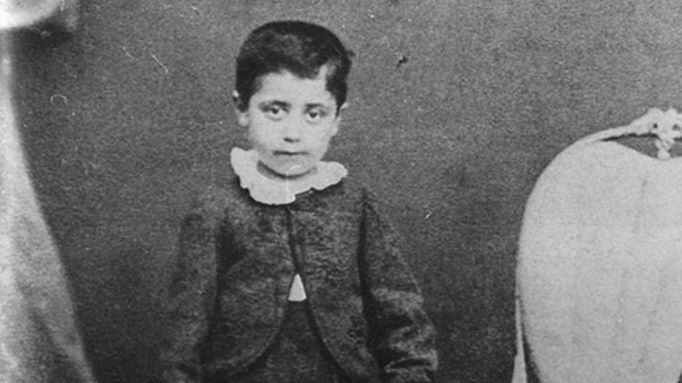
Gustav Mahler as a child
As a child, Mahler witnessed many of his siblings dying young, and he found himself drawn to this material. His setting of “Wenn dein Mütterlein” (“When Your Mama”) is especially heartbreaking:
When your mama
steps in through the door
and I turn my head
to see her,
on her face
my gaze does not first fall,
but at the place
nearer the doorstep,
there, where your
dear little face would be,
when you with bright joy
would step inside,
as you used to, my little daughter.
Tragically, three years after Mahler finished this work, one of his own daughters would die of scarlet fever.
“When I really lost my daughter, I could not have written these songs anymore,” he confessed to a friend.
About Mother by Josef Suk (1907)
Josef Suk wrote these sweet piano pieces for his children about their mother. (In a callback to an earlier piece on this list, that mother was none other than Antonín Dvořák’s daughter!)
There are flashes of Bohemian or Dvořákian characters here, as interpreted by a younger composer from a new generation.
Ma Mere l’Oye by Maurice Ravel (1910)
The Ma Mere l’Oye (or Mother Goose) suite was originally composed as a simple piano duet for two of his friends’ children.
One of those children later recalled, “Ravel used to tell me marvelous stories. I would sit on his knee and he would begin, ‘once upon a time…’ And it was Laideronette, Beauty and the Beast, and the adventures of a poor mouse that he had made up for me.”
Turns out Maurice Ravel was a bit of a mother hen himself!
The work was so enchanting that Ravel soon orchestrated it, to great effect.
Two Musical Relics of my Mother by Percy Grainger (1905-12)
Australian composer Percy Grainger and his mother Rose had a famously (some would say infamously) close relationship. When he was a boy, his father cheated on his mother, giving her syphilis. Understandably, there were tensions at home.
Percy wrote his first works for his mother, and, as he was homeschooled, she was his main teacher.
Rose turned into her son’s personal and professional manager, and they lived together until her death in 1922.
Senza Mamma from Suor Angelica by Giacomo Puccini (1917)
Puccini’s one-act opera Suor Angelica is set in a convent. Three nuns discuss their dreams. Sister Angelica confesses that she dreams of being contacted by her wealthy noble family, whom she has not heard from in seven years.
A visitor arrives. It’s Angelica’s aunt, who wants her to sign a piece of paper. Once she does, Angelica’s claim to her inheritance will be renounced.
Angelica reveals that she had an illegitimate son seven years ago. Her aunt coldly informs her that the child has been dead for two years.
Angelica hallucinates her son and drinks poison. She realizes too late that she is dying by suicide, a mortal sin that will separate her from her son in the afterlife.
In desperation, she calls upon the Virgin Mary to send her a miracle. Just before she dies, she sees her son running toward her to hug her.
This stunning aria gives full voice to Angelica’s motherly heartbreak.
Mother and Child by John Ireland (1918)
English composer John Ireland wrote this set of eight brief songs based on nursery song poems by author Christina Rossetti.
The final poem is a gut punch; it describes flowers in a garland “for death”, presumably a funeral arrangement.
Cradle Song of the Lonely Mother by Amy Beach (1924)
Composer Amy Beach also addressed a similar topic.
In this somber cradle song, the gentle rocking rhythms and eerie chromaticism suggest that a mother is remembering a child who has died.
It’s a heartbreaking reminder of how the loss of a child was a formative life experience for so many mothers throughout the history of classical music.
Tiny’s Song from Paul Bunyan by Benjamin Britten (1941)
In 1941 British composer Benjamin Britten wrote an operetta tackling one of the most American of characters: mythical lumberjack Paul Bunyan.
In the operetta, the massive Paul Bunyan (reportedly as tall as the Empire State Building) finds a wife as tall as he is, and she gives birth to a woman they name Tiny.
Mrs. Bunyan isn’t happy at home, so she leaves the household and eventually dies.
When Tiny arrives in camp, the men are attracted to her, since she is the only woman. She explains she is not in the mood for love; she is still mourning her mother.
Lullaby, From Jewish Folk Poetry by Dmitri Shostakovich (1948)
This gloriously off-kilter lullaby is a deeply moving work by Shostakovich.
It comes from his song cycle From Jewish Folk Poetry. He said that he was intrigued by the idea of “a jolly melody on sad intonations.”
The words are tragic; the mother is singing to her child about its father, who has been imprisoned by the Tsar in Siberia.
“Sleep, my dear, whilst no sleep comes to me,” the mother implores her son.
Two Hymns to the Mother of God by John Tavener (1985)
English composer John Tavener wrote a simple introduction in the score to his Two Hymns to the Mother of God:
These Two Hymns were written in memory of my mother. The first is for double choir and is a setting of a text from the Liturgy of St Basil. It speaks of the almost cosmic power attributed to the Mother of God by the Orthodox Church. The second comes from the Vigil Service of the Dormition (of falling asleep) of the Mother of God. She invites the apostles to gather from the end of the earth to bury her body in Gethsemane and asks her to receive her spirit.
For more of the best in classical music, sign up for our E-Newsletter

